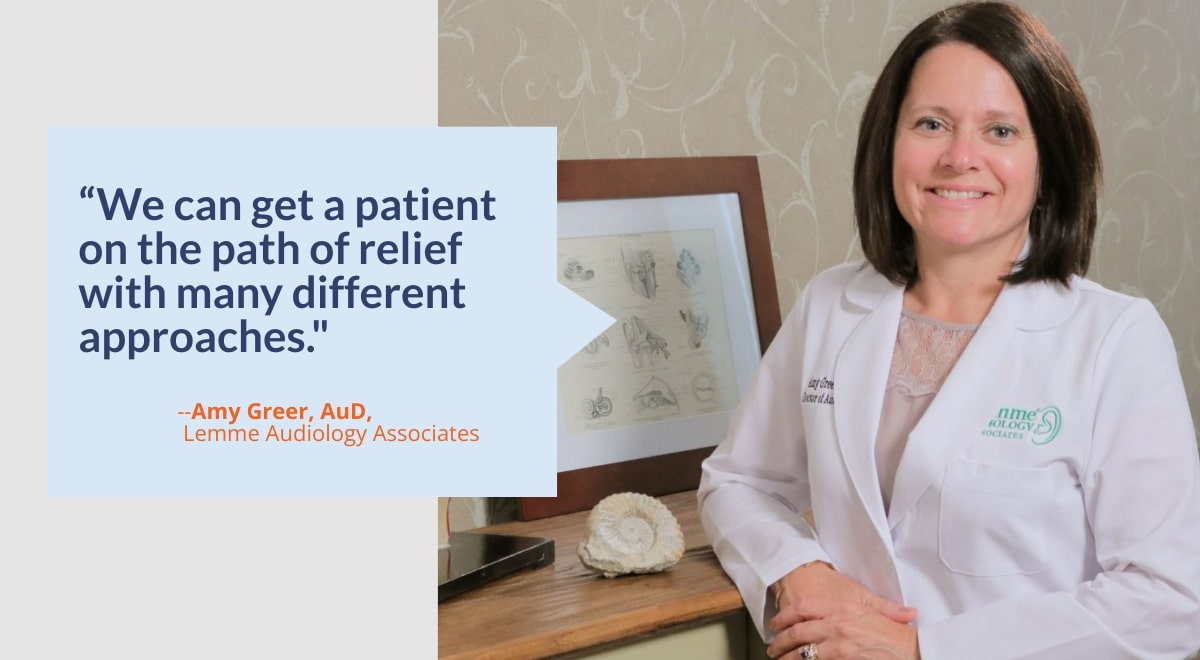|
www.HealthyHearing.com |
What this tinnitus doctor wants chronic sufferers to knowMany methods can ease the frustration of living with tinnitus
Contributed by Madeleine Burry Pennsylvania resident Frank M. experienced tinnitus for decades—23 years total—before finally finding relief with Amy Greer, AuD, FAAA, of Lemme Audiology Associates. He drove more than 200 miles, desperate for help. After his appointment, overcome with gratitude, he left Greer an effusive review, highlighting how badly tinnitus patients need expert care. "After being told by numerous doctors that there was no cure and to learn to live with it, I received the most comprehensive hearing exam from Dr. Amy, who knew far more about my problem than any other doctor before," he shared on her clinic's Healthy Hearing profile. More than 25 million adults in the U.S. experience tinnitus, which is characterized by ringing, buzzing, or whooshing sounds in your ears. These noises can vary in intensity and also duration. It can be a maddening condition, especially if your medical providers seem unable or unwilling to help.
Greer wants all tinnitus patients to know that there is hope, and there are many treatment options that can ease the frustration that accompanies this condition. Finding a audiologist who has experience treating the condition is important. For example, Greer is certified through the American Board of Audiology for tinnitus and hyperacusis management, and participates in continuing education on these areas. She's often the last stop patients have, after visits with a primary care provider or ENT. “Most medical providers know about tinnitus, but not many know what to do with it,” she says. It’s true that tinnitus can’t be cured or reversed, she notes. But don’t think of that knowledge as a stopping point. Here’s how Greer works with patients who experience tinnitus. How appointments startThere’s a spectrum when it comes to tinnitus severity, Greer says. For some, it’s an occasional annoyance, but one that doesn’t affect sleep or conversation. “Then you have patients on the other end of the spectrum who are debilitated,” Greer says. For them, the symptoms stand in the way of everyday life. “They are at the end of their rope,” Greer says. So her first step at appointments is evaluating where patients are on this spectrum. This involves taking an in-depth patient history, involving questionnaires, including the Tinnitus Functional Index, which looks at 12 areas of function (e.g., sleep, concentration, auditory function). Greer also does tests to assess auditory function. Some people have tinnitus “in isolation,” she says. Others experience both impaired hearing and tinnitus. (In fact, this is quite common; more on that in a moment.) Exploring treatment optionsAfter these assessments, Greer’s next step is to discuss different treatment options. Just as there is a spectrum of options when it comes to the severity of people’s tinnitus experience, so too are there a range of treatment options, including:
Sometimes, just having a conversation is helpful with tinnitus management. “It may be just kind of correcting misinformation or demystifying tinnitus,” Greer says. She points out that over-the-counter supplements you may come across aren’t regulated. They may in fact may contain ingredients that are ototoxic (aka causing hearing loss or tinnitus). When it comes to treatment options, Greer is looking to land on the option that’s right for a particular person. It’s about figuring out what best meets a person’s needs, as well as what they’ll be compliant with. (Hearing aids that treat tinnitus are no help if a person doesn’t wear them.) It’s about “working together to find that best solution,” Greer says. Read more: Cognitive reframing techniques for tinnitus sufferers Greer’s recommendation: Seek helpUnderstanding of tinnitus has come a long way. In the past, Greer points out, “one approach to tinnitus management was they would sever the auditory nerve,” essentially destroying hearing without ending the tinnitus. Only in the 1970s and 1980s did scientists shift to understanding tinnitus as a brain issue, as well as an ear one. These days, there are ample evidence-based treatments available that can make a meaningful difference. “We can get a patient on the path of relief with many different approaches,” Greer says. “Any amount of help you can give someone suffering from tinnitus is a good win,” Greer says. Madeleine Burry
|
Featured clinics near me
Earzlink Hearing Care - Reynoldsburg
7668 Slate Ridge Blvd
Reynoldsburg, OH 43068

Find a clinic
We have more hearing clinic reviews than any other site!



 Madeleine Burry is a Brooklyn-based freelance writer and editor. She's written about health for several online publications, including Women's Health, Prevention, Health, Livestrong and Good Housekeeping. You can follow her on Twitter @lovelanewest.
Madeleine Burry is a Brooklyn-based freelance writer and editor. She's written about health for several online publications, including Women's Health, Prevention, Health, Livestrong and Good Housekeeping. You can follow her on Twitter @lovelanewest.